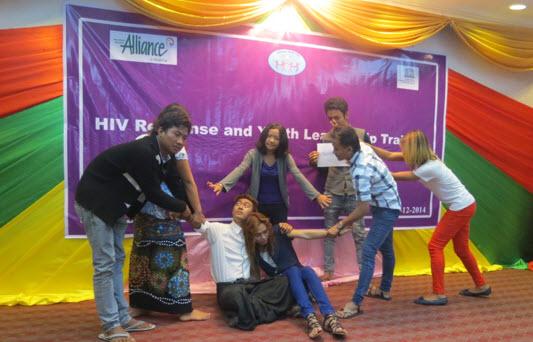
An effective national HIV response requires listening to and learning from those most affected – and, most importantly, ensuring their passion and perspectives are heard by empowering them to be community leaders.
This has been UNESCO’s approach in Myanmar since 2012 when the organization and partners held the first New Gen Training course to promote youth leadership among young key populations at higher risk of HIV exposure (*).
It was also with this in mind that UNESCO agreed to partner with the International HIV/AIDS Alliance in Myanmar in late 2014 to develop the leadership skills of more than 200 youth from, and working with, key populations through the Myanmar Youth Star Network, the only youth-led national network for these youth in the country.
Sardar Umar Alam, the Head of UNESCO’s Yangon Office, spoke of the importance of empowering young key populations to take leadership roles during his opening remarks at the December training led by the Myanmar Youth Star Network.
The training, “HIV response and Youth Leadership Course for Young Key Affected Populations” was held from 17-19 December 2014. The program, based on the original New Gen Training course in 2012, aimed to equip participants with the skills they need to play a more prominent role in the national HIV response as well as to become future leaders in advocacy on the issue.
Five young leaders facilitated the training, which was attended by 32 youth participants from key populations. Of the participants, 22 were from 15 townships outside of the Yangon region, including highly-affected and hard-to-reach townships.
Understanding the challenges young key populations commonly face was one of the main objectives of the training, using, for example, an “ecological model” to understand the influences on and root causes of behavior. Common characteristics of effective interventions as well as “ladder of youth participation” (going from manipulation of young people at the base level to shared decision-making with adults at the top) were also reviewed.
Understanding data and using it as a tool in advocacy and programming was another focus of the training, as well as providing young key populations with the leadership skills they need to represent their communities in HIV response at different levels. Key to this objective were discussions on such issues as what goes into making a good leader; how to enlist others to advocate for change; defining a desired outcome in society and selecting strategies to achieve it as well as delivering speeches and tailoring messages to specific audiences.
In his opening remarks, Dr Soe Naing, Executive Director of the International HIV/AIDS Alliance in Myanmar, which held a series of preparatory meetings prior to the training, said this support was enabling young key populations to be front and center in discussions on the national HIV response. Ko Kyaw Min Htun, from the Myanmar Youth Star Board of Directors, also welcomed the training participants, who had come from throughout Myanmar.
The 3-day training was well-received by participants.
“I am very happy to have attended this training and enjoyed and fully participated in all three days,” said Pearl, a young person supporting programming for young men who have sex with men. “This training was conducted differently from other similar types of training. I hope I have the chance to participate in future programs like this and that more of my peers have these opportunities.”
With UNESCO’s support, the International Alliance and the Myanmar Young Star Network will conduct three more training sessions in 2015 and will also roll out HIV prevention and leadership strengthening activities for young key populations in five hard-to-reach areas where risky behaviors for HIV transmission are common.
----
(*) Young key populations at higher risk of HIV exposure include anyone between the ages of 10 and 24 years who is most likely to be exposed to HIV or to transmit it. This includes young men who have sex with men, transgender persons, people who inject drugs, sex workers and their clients and people living with HIV.
Contact: Pyi Pyi Phyo, UNESCO Yangon (pp.phyo@unesco.org)
